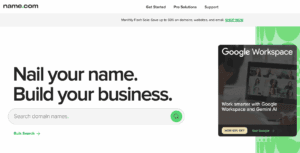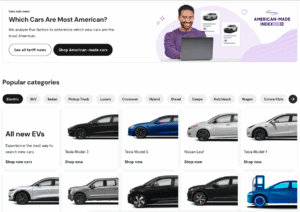Biggest Trends That Will Help You Buy Premium Domain Names In 2025
Looking to buy domain names in 2025? Here’s Name Experts Director Joe Uddeme with a roundup of emerging trends and things to look for when adding a name or two to your portfolio. Buying the right domain is crucial for a successful business, which is why our professional team at NameExperts.com makes sure to stay on top of emerging trends. What was right for your business a decade ago – probably your brand name + .com – might still be relevant today, but there are newer alternatives and domain name combinations that consumers are comfortable with, too. Purchasing premium domain names is a great idea for any emerging business that wants to scale their brand. Top companies around the world are teaming up with domain brokers to help them buy premium domain names at the best prices – and with their anonymity preserved if necessary, too. Save money, add credibility, and give your company equity value when you work with experts like us. Key Takeaways GDPR has changed the rulebook There are now more TLDs (.com, .ai, .io, etc.) than ever – but not all are popular Catchy ‘meaningless’ names can become very valuable Trend #1: Easier Identity Protection Have you heard of GDPR? When it comes to identity and privacy online, it can be very difficult to identify actual ownership of domains – which is why we recommend working with a top domain broker who has the skills to properly identify owners and help you navigate the domain world. The General Data Protection Regulation, or GDPR, is a new and strict set of rules and regulations that mandate how businesses that gather customer data and also how they must protect that data. It also outlines severe penalties for companies that violate the GDPR. This can make it that much more challenging to identify who owns what. No matter the size of your company, if you’re doing business in Europe, you should be thinking about how you’re protecting your employees’ and clients’ information online. Trend #2: Reduction In GTLD Registrations TLDs are the letters found at the end of an internet address, such as .com, .net or .org. Any TLD that isn’t representing a country or territory is known as a generic top-level domain. The New gTLD Program was an initiative coordinated by the Internet Corporation for Assigned Names and Numbers (ICANN), which has increased the domain name system. With the introduction of new top-level domains, it was meant to enhance competition and consumer choice when it comes to domain names. It also brought many new safeguards to help support a secure, stable and resilient internet. Though there is a rise in new generic top-level domains or gTLD registrations, the trend is that many registrations are not being renewed – meaning there is limited value in this type of asset. There are so many different domain identifiers, like .law, .brand, .legal that it is easy to get carried away. We believe these new registrations will continue to decline and buyers will focus much more on sensible and dependable options such as .com, .co, .net, and .org. However, there are several newer options that can be worth investigating. These include .ai domain names and also .io, which are beloved of tech brands. Trend #3: Interesting Combinations and Lateral Thinking Verbs and action phrases at the start of a domain name are in vogue. Things like ‘get’ or ‘try’ – resulting in www.getselfhelp.co.uk, for example. Thinking laterally also leads to the likes of Zyro and Figma, which have become highly-prized brands based around words that didn’t exist. We regularly help clients to align themselves with strong and/or catchy names that appear to be unavailable. It’s one of the many reasons that people turn to a domain broker. As well as helping you to choose a strong brand name that has long-term value, we bring expert negotiation skills to the table. We also take care of every element of the transaction – from soup to nuts. Our team offers a full-service domain name brokerage experience for each one of our clients. It’s our mission to protect our clients’ anonymity and deliver great results. From domain name acquisition to the divestment process, we have the knowledge you need to help you grow your business and protect your assets. About the author Joe Uddeme is Director and Principal of Name Experts, one of the world’s leading domain name brokerage services. He has overseen domain name sales and acquisitions totaling more than $150 million and is renowned worldwide as a go-to expert in buying and selling premium domains. Contact us at: [email protected]







